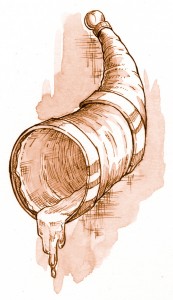Q&A: Be careful for what you say against God’s anointed…
 Anonymous asks: Be carefull for what you says against God anointed.
Anonymous asks: Be carefull for what you says against God anointed.
Well, it’s not really a question, but I’ll respond anyway. And I’m assuming that this is something to do with the strange popularity of my blog with regards to African “prophet”, Dr. Owuor. The most popular of the incidental things I have had to say on this man (he’s not actually someone I’m that interested in) can be found: here.
But I will push back a bit. The phrase you use about being careful about speaking against God’s anointed is one of those phrases that is often misused, particularly by large personalities who wish to squash dissent rather than exercise humble, servant-hearted leadership.
The phrase comes from 1 Samuel where David, on the run from Saul, anointed by God through Samuel to be king, is put in a situation where he can do away with King Saul (who had been anointed as king before hand) once and for all. Yet he chooses not to seize power for himself in his own strength but to rely on God. In this spirit he warns his men, “Don’t destroy him! Who can lay a hand on the LORD’s anointed and be guiltless?” (1 Samuel 26:9)
The context instantly suggests that the use of this phrase by those already in power is actually a mis-use. If the analogy were to be drawn it would be akin to Saul telling David “Don’t you hurt me, I’m the Lord’s anointed don’t you know!” Rather it’s demonstrative of David’s heart of faith that is willing to trust in God and to receive any power he might get as a gift, not to grasp it (or keep it) through blood.
We must also ask who the “Lord’s anointed” is? David is referring to the first of Israel’s messianic king’s (the word “messiah” simply means “anointed one). The messianic kings are typified in Saul, negatively, and in David, positively, and culminate, perfectly, in the person of Jesus Christ. The application of “laying a hand on the Lord’s anointed” pretty much find’s its crescendo in the crucifixion in which humanity demonstrates a guilt-filled propensity to do away with the Author of Life. It is the beauty of the gospel that the truth of our guilt (from the human side) is most clearly demonstrated in the moment when grace, love, responsibility, and propitiation occurs (from the divine side).
If we are to apply the warning to not attack the Lord’s anointed in today’s context, in my view the most immediate application would be something like the argument in Hebrews 6 in which those “who have once been enlightened, who have tasted the heavenly gift, who have shared in the Holy Spirit, who have tasted the goodness of the word of God and the powers of the coming age and who have fallen away, to be brought back to repentance. To their loss they are crucifying the Son of God all over again and subjecting him to public disgrace.”
When it comes to a consideration of self-professed prophets like Dr. Owuor, the phrase from 1 Samuel does not really apply. More appropriate is the methodology of the Bereans in Acts 17 who submitted even the teachings of the Apostle Paul to an examination of Scripture. And of course there are the warnings against false prophets, who even though they come with signs and wonders are yet still false. Consider Matthew 7:15, 22; 24:24; 2 Peter 2:1; 1 John 4:1; 2 Tim 4:3; Rev 16:14 etc. etc.
![]() Q&A: Be careful for what you say against God’s anointed… by Will Briggs is licensed under a Creative Commons Attribution-NonCommercial-ShareAlike 4.0 International License.
Q&A: Be careful for what you say against God’s anointed… by Will Briggs is licensed under a Creative Commons Attribution-NonCommercial-ShareAlike 4.0 International License.


